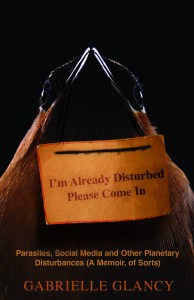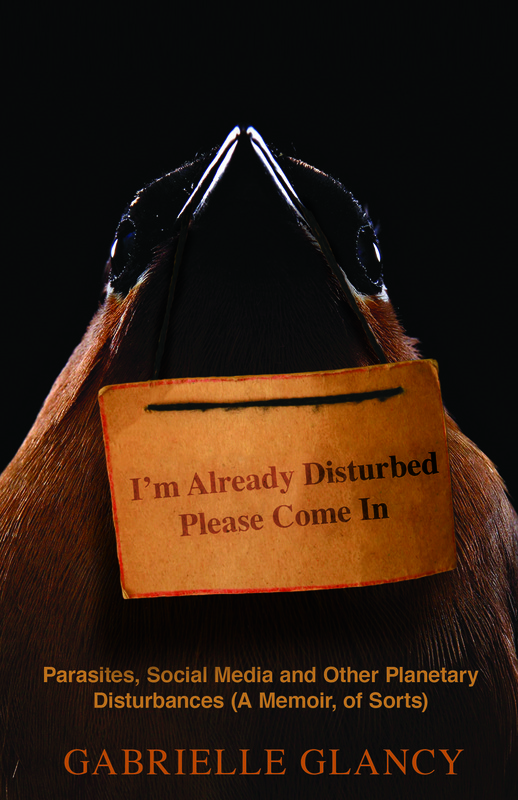 I’m Already Disturbed Please Come In: Parasites,
I’m Already Disturbed Please Come In: Parasites,
Social Media and Other Planetary Disturbances
(A Memoir, of Sorts)
by Gabrielle Glancy
Oneiric Press. 192 pages, $16.95
To begin with, the disturbances that rock the author’s life in this lively, offbeat sort-of memoir are not by any stretch planetary—except perhaps in the narrow sense of being wandering or erratic. Nor have they been provoked by social media as such, in spite of the plentiful Facebook screen shots included. Instead, what caused Gabrielle Glancy’s ills turn out to be hordes of unseen and fairly common freeloaders, most of them parasites: in a word, worms.
I’m Already Disturbed is structured as a series of short essays but moves at the brisk pace of a novel, taking the reader on a quest to find the cause of the author’s debilitating and curious symptoms, and their cure. Glancy adds more complicated pursuits to her medical search, the first in the realm of relationships and the second about writing. Coming to grips with the Big M—mortality—undergirds all three stories, perhaps not surprising given that the author is turning fifty years old.
The scene is Oakland, California, where Glancy lives. A poet and essayist, the writer founded and directs New Visions Learning, a college admissions counseling service. Her previous books include The Art of the College Essay and Best College Essays 2014, which she edited. Her attempts to find medical treatment form the main story line, and it is a compelling one. Her puzzling symptoms begin about two years after adopting a baby boy from Guatemala (following four miscarriages), and only a week after meeting Sudha Faraday, who also has a young son. Glancy experiences palpitations, a foggy head, and lack of energy that compel her to find relief by lying down on the floor during a routine workday. Soon she’s coping with a tightening jaw, a stomach that expands and gets hard, and feelings of extreme weakness. She felt “like a huge throbbing animal, one big whale of a nerve like the mother tree in Avatar.”
The symptoms erupt suddenly, leading to multiple emergency room visits followed by appointments with internists, cardiologists, and other specialists. Reluctant to visit doctors—especially when sick, which “takes all the fun out of it”—the worried writer nonetheless seeks their help. She reports on these encounters with verve and dark humor. Some doctors are curt, others merely dismissive, suggesting that her problems are psychological. All of them fail to parse the patient’s own description of her symptoms, instead ordering a raft of EKGs, EEGs, CT scans, and neurological exams that lead nowhere and leave her increasingly distraught.
After nearly a year of struggling with job responsibilities and childcare, Glancy has a breakthrough: “One day I realized it wasn’t all in my head, it was in my stomach.” Unfortunately, her gastroenterologist tags a small duodenal ulcer as the culprit, and treatment proves useless. In despair, the author follows the advice of an old friend and meets with an “integrative medicine” guru who lacks a medical degree but does have common sense and the ability to listen. A simple stool test identifies an infestation of parasites that Glancy had probably picked up years before, during stays in Guatemala or Egypt, along with a bacterium possibly (and, if so, ironically) contracted more recently, in a local ER.
Treatment for the infestations is arduous and lengthy, but it yields improvement. At the same time, however, other dilemmas are on the patient’s mind, demanding attention. For one thing, having endured several heart-crushing love affairs, the memoirist doubts that she can ever form a lasting romantic bond. However, when Faraday, who sustained her through months of health crises, helps her get through what would be the final attack, Glancy is hit hard. The two share an intimate afternoon swim, and the author finds herself moving toward commitment: “I could fall for this girl, I thought. I’m really in trouble now.”
Glancy’s concern about her writing forms a third story line. Having had poems published earlier in The Paris Review and The New Yorker, she had stopped sending out material in the wake of a disastrous romance. “I guess you could say I went underground,” she says, “but only for about twenty-five years.” While in the hospital for observation after an attack, she dreams of receiving the Nobel Prize for literature. Impossible, or clearly improbable—but indicative of her longing.
During waking hours, she seems exquisitely aware of what others have been writing and envious of writers such as Eileen Myles or Robert Hass, whose poetry she admires and whom she counts as friends. Internet postings of these writers remind her of lost opportunities, and a picture of Hass after he was beaten at an Occupy Berkeley demonstration reminds her of how she has dropped out, not just from the literary world but also from social activism.
Ambition and achievement might not be perfectly aligned, but Glancy’s direct, spare sentences and almost offhand reflections speak credibly to the mix of feelings that someone in similar distress might have. Her prose style recalls Myles’ set of travel essays, The Importance of Being Iceland, as well as Anne Carson’s book of elegiac essays, Nox. Like Carson’s memoir, I’m Already Disturbed displays photographic images that prompt the writer’s musings, in this case Facebook screen shots. The reproduced pictures nimbly convey the writer’s associations and thoughts, although a few of the reproduced text images are too blurry to decipher.
From the evidence here, Facebook would appear to be of mixed worth for writers. Some screen shots help carry the memoir’s plot; for example, when Glancy can’t locate the photo of a fly made out of dust bunnies that she had saved, we sense the tension and can exult with her when it re-emerges. At the same time, immersion in social media looks like a distraction. “When I feel good, I tell the story of what happened,” the author states. “When I can’t do that, I facebook.”
I’m Already Disturbed offers a narrative and sub-tales that converge in credible resolution, with the writer returning to health, more broadly understood. Glancy comes to realize that life in fact is limited (a third writer-pal, David Rakoff, has died), and that joy comes less from electronic exchanges than from engaging with work that matters, and from face-to-face encounters with family and friends. When the boys finally ask why she’s been sick, Glancy doesn’t hesitate. “‘Mommo’s had worms,’ I said. … They looked at me amazed. I drew a picture of an oval with little yellow squiggles inside. ‘That’s my stomach. And those are the worms.’” Her straightforward reply affirms the calm awareness that marks the conclusion of this vivid, intriguing book.
Rosemary Booth is a writer and photographer living in Cambridge, Massachusetts.






